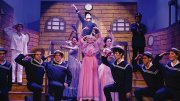ASher Chamoy ’25 tried multiple times, to no avail, to convince his high school to mount a work by the Victorian dramatist-composer duo W.S. Gilbert and Arthur Sullivan. “I was always trying to get them to do The Pirates of Penzance or some other G&S show, annoying the teachers—like, ‘Hey, have you ever thought about doing this?’” he recalls. “Never happened.”
A “huge musical theater aficionado,” Chamoy, a Slavic languages and literatures concentrator, mostly performed in contemporary shows like Les Misérables and Grease. But he had a special fondness for the Gilbert and Sullivan operettas. He grew up in Dallas, watching the 1983 movie version of The Pirates of Penzance with his father and rehearsing songs from the G&S canon with his vocal coach. He appreciated the balance offered by their music: more complex than modern musical theater, but more accessible than traditional opera. He loved the witty, exaggerated plots that explored “the quintessential parts of human life in such a fun and comic way.” And, of course, there was the humor, which never forced itself to be more sophisticated than necessary: The Pirates of Penzance centers on Frederic, a hapless orphan accidentally apprenticed to a band of pirates. At 21, he is finally free to leave them—until he learns he was born on February 29, meaning he’s only five years old and must serve another 63 years.
When Chamoy arrived in Cambridge in 2021, he discovered the Harvard-Radcliffe Gilbert and Sullivan Players (HRG&SP), one of the few college organizations in the country dedicated exclusively to G&S—and the fall production was The Pirates of Penzance. He auditioned and was cast as the Pirate King, a leading role. “It was a magical first semester,” he recalls, not just because of the performances, but also because of the people he met. “There are a lot of people who become very passionate about it, because it is something that’s very niche…. And that community of people is really, really strong.”
Nor does the organization appeal only to longtime fans. In spring 2023, HRG&SP was preparing a production of The Sorcerer. Haley Stark ’25, now the group’s secretary, received an email from the Quincy House listserv announcing that the organization was seeking a director. Stark had performed in theater since elementary school and was concentrating in psychology and theater, dance, and media. Though she had never read the libretto of The Sorcerer, she had long wanted to explore directing—and HRG&SP provided an opportunity to try.
Directing The Sorcerer, Stark saw the conventions of G&S operettas not as limitations but as opportunities: having a small, defined repertoire of shows—each associated with established rules and customs—reduced the amount of choice involved, making her feel freer to experiment. “You get to explore the bounds of something that’s been created for you and handed to you,” she explains. “You can refine your own style and craft because you’re not starting from scratch.” In one scene of The Sorcerer, for example, two characters with a long, unexpressed romantic tension have a formal conversation. Intermittently, one breaks the fourth wall to reveal their true feelings to the audience, while the other remains frozen in a dramatic pose. Stark decided to shine a spotlight on the motionless character to emphasize the contrast between these two modes of interaction. She recalls, “It was such a small design choice—we broke from tradition for just 20 seconds, and it ended up getting the biggest laughs of the show.”
The students also decided to modernize the plot, making the lead couple two women rather than a woman and a man. That choice added a contemporary twist to the humor: “When a woman is delivering a line about a woman not being suited to make a decision, there’s just a whole other level of comedy that comes out of that,” Stark says. Decisions about how to make such adjustments are collaborative, adds HRG&SP treasurer Eliza Zangerl ’26, an English and theater, dance, and media concentrator. When she performed in the fall 2022 production of Iolanthe, she remembers the director asking her, “Do you think we should modify these lines to be more updated? Do you feel comfortable with the way your femininity is being represented on stage?”
After the production of The Sorcerer, many members of the group graduated; the reduced numbers left the organization in a fragile state, and it hasn’t put on a full production since. Last January, Chamoy volunteered to be president, hoping to help revive interest. He and the other board members—who joined HRG&SP largely because they loved performing, singing, directing—have now shifted their focus to logistics, trying to lay a foundation for future productions. They spent the last year renewing contracts for storage units, meeting with alumni for advice, and making sure the organization remains active. Late this fall, HRG&SP plans to stage a concert of Gilbert and Sullivan’s greatest hits—a more flexible format than a full show that will allow students to perform their favorite songs while introducing new audiences to the work.
Some might wonder if HRG&SP’s time has simply passed. With so many musical productions to choose from, why should students join an organization dedicated to 14 operettas written in the late nineteenth century? But past and present members say HRG&SP’s niche focus is exactly what makes it special: it fosters close relationships, sparks creativity, and encourages students to take risks. Stark, for example, says HRG&SP provided a more accessible, low-key setting to try directing than other campus performing groups.
Students also say they feel a duty to preserve the group’s history. Founded in 1956, HRG&SP is second only to Hasty Pudding Theatricals in College drama longevity, and students say they enjoy the challenge of honoring that legacy while planning for the group’s future. Recently, in deciding how many storage units to maintain, board members had to decide whether to throw away or save old sets. It was tempting to trash the sets of shows that have become less popular because of stereotypes: for example, The Mikado, set in Japan, is criticized for offensive depictions of East Asians. The students ultimately decided to pay for the extra storage. “If someone is really spoken to by the material and says, ‘This is my identity and I know how to represent it properly,’” Zangerl says, “we want to make sure people have the option to do that.”
These students planning for the organization’s future also receive support from its past. Though HRG&SP has no formal alumni board, says former member David Jewett ’08, a network of graduates remains active in donating and offering advice.
Megan Amram ’10, who has written for The Good Place and The Simpsons, performed with HRG&SP as an undergraduate. When she first encountered The Pirates of Penzance, she was struck by how a character mistakes the word “pilot” for “pirate” and recalls thinking “how stupid that was, in a really amazing way.” She continues, “I say this in the most complimentary way I can—it was very formative for me to learn that cleverness can boil down to puns and base humor.”
In writers’ rooms today, Amram remembers late nights in Harvard conference rooms where she and fellow HRG&SP members navigated budgets and decided whether and how to adapt the Gilbert and Sullivan works. “So much of it is about communication and conflict resolution,” she says. “People just want to feel heard. They want to know why you’re doing things. And when I became a producer in my adult life, I realized that is the only thing you need to remember. And I’m so grateful for the opportunity I had to practice it when I was still a college student.”









